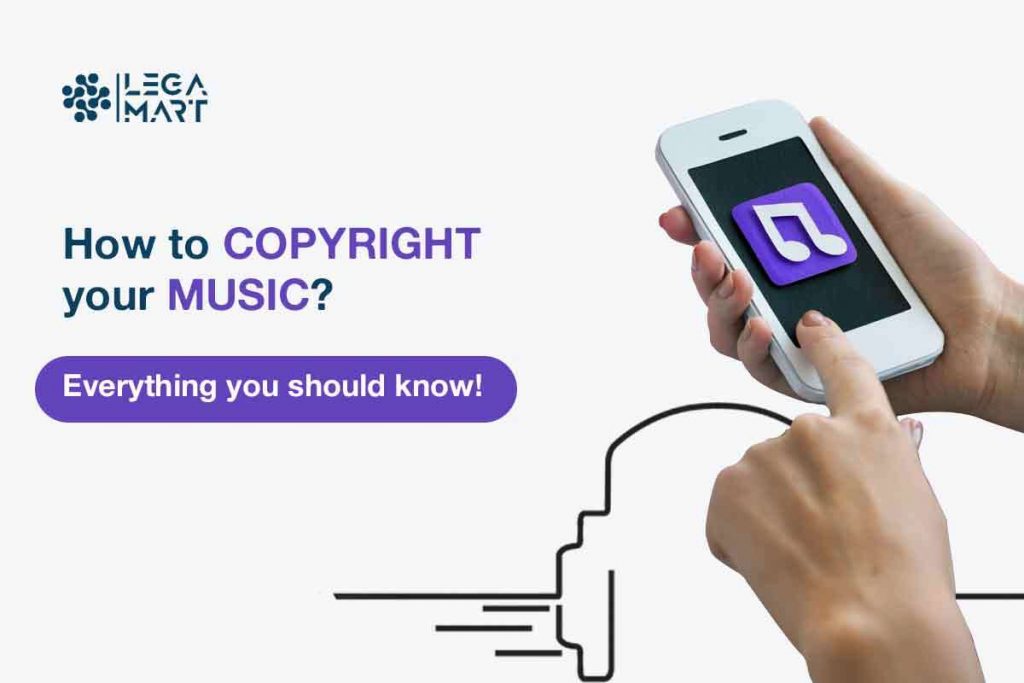- What is a copyright?
- Copyright Vs. Related rights
- What is music copyright?
- Copyright protections
- What music is eligible for copyright?
- Rights of copyright owners
- Copyright registration
- Ways to copyright your music(applying for copyright registration)?
- Copyright infringement in music
- How to protect your song from copyright infringement?
- Rules of music copyright law
- Length of copyright registration
- Limitations on copyright
- How much does it cost to get a copyright?
- How to copyright a song?
- How to use copyright to protect your work?
- Conclusion
If you are a musician or songwriter, understanding how to copyright your music is essential. This crucial aspect of Cross-Border & International Law ensures that behind every royalty, streaming payout, and sync license, there is a protected copyright and an exclusive owner. While you inherently own your musical work the moment you record or write it, registering your copyright is a vital step to legally protect it, especially in a globalized music landscape.
Therefore, Copyright protection ensures that your music is recognized as your intellectual property, and no one else can use it without your permission. When you copyright your music, it grants you exclusive rights to your music, such as the right to reproduce, distribute, and perform it publicly. Copyrighting your music can also help you protect your revenue streams and prevent others from profiting off your work without your consent.
What is a copyright?
Copyright refers to the rights of the creator, author, or original copyright owner over their work. It is an intellectual property right that protects the original work against unauthorised or unlawful usage. The work to be copyrightable under this intellectual property must be original and, apart from this, must have some skill, labour or judgement in its creation.
Copyright Vs. Related rights
What are related rights?
Related rights, also known as neighbouring rights, are exclusive rights granted to individuals or entities, not the creators of original works but who play a significant role in their distribution or performance. These rights are in three categories; rights of performers (such as musicians, singers and dancers); rights of producers of sound recordings (such as cassette recordings and compact discs); and rights of broadcasting (such as radio and television programs).
Related rights protect the interests of those involved in producing and distributing creative works and ensure that they receive fair compensation for their contributions.
Copyrights safeguard creative works, whereas related rights are bestowed upon select groups of individuals who play a crucial role in communicating and distributing certain types of works to the public.
What is music copyright?
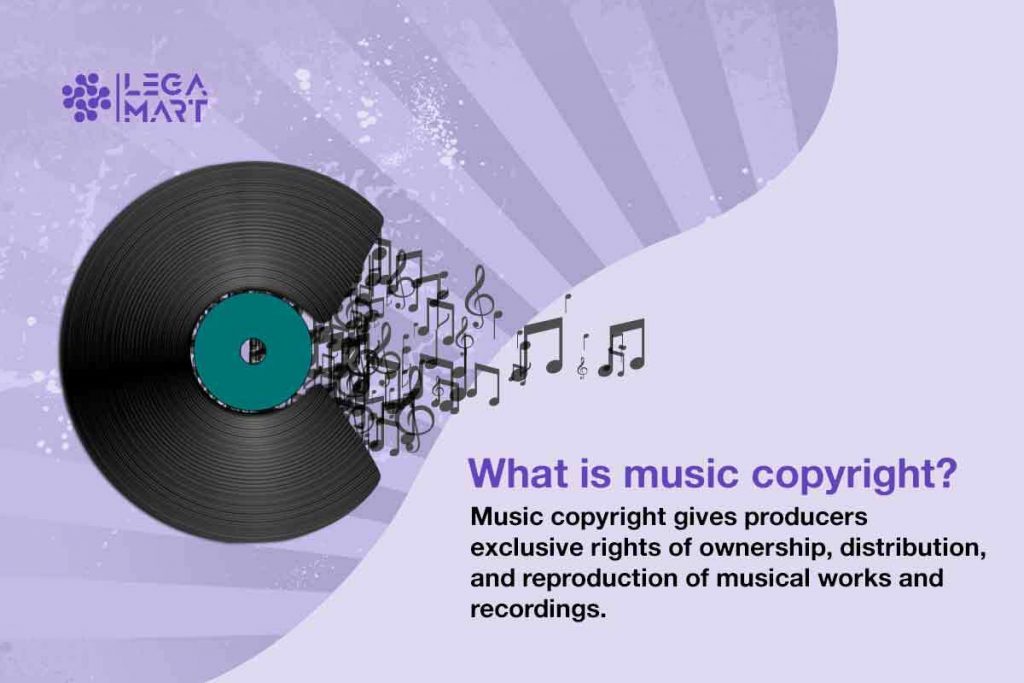
Music copyright gives producers exclusive rights of ownership, distribution and reproduction of musical works and recordings. There are two types of music copyright; master and composition. Master covers the specific sound recording containing a particular expression of the underlying composition created by the music artist. Composition covers the melodies, notes arrangement, and chords in a specific sequence.
According to the US Copyright Office, once “the sound is captured, which means that the sound must be recorded on a medium that can be sensed, copied or otherwise transmitted.” the master recording is protected by copyright, “in digital tracks, optical discs, tape or another format.”
Copyright protections
The music is protected by copyright from the moment it is fixed, and for additional benefits, music can be registered with the US Copyright Office. Registering the music work makes a public record of ownership and gives access to federal courts in the unexpected event of copyright infringement.
Types of Copyright-Protected Works
When you are recording a song, there is a possibility that you are creating 2 different work types which are protected by copyright: a musical work and a sound recording. These are subjected to different rules and commonly owned and licensed separately:
- A musical work is the underlying composition and the accompanying lyrics of the song. These are usually created by the songwriter or composer.
- A sound recording includes a series of musical, spoken, or other sounds which are fixed in a recording medium, such as a CD or a digital file (phonecord). These recordings are created by recording a performer, producer, or others. There does not exist any public display right for sound recordings, and the public performance rights are limited to ‘digital audio transmissions’ (example – digital streaming).
What music is eligible for copyright?
Both musical work and sound recording are copyrightable. A musical work is an underlying musical composition of a song along with its lyrics which are usually created by a songwriter or composer. A sound recording is a series of musical, lyrical, or other sounds in a particular recording. Therefore, Lyrics, jingles, incidental music, symphonic pieces, and songs are copyrightable. But song titles, chord progressions and incomplete music can not be copyrighted.
Rights of copyright owners
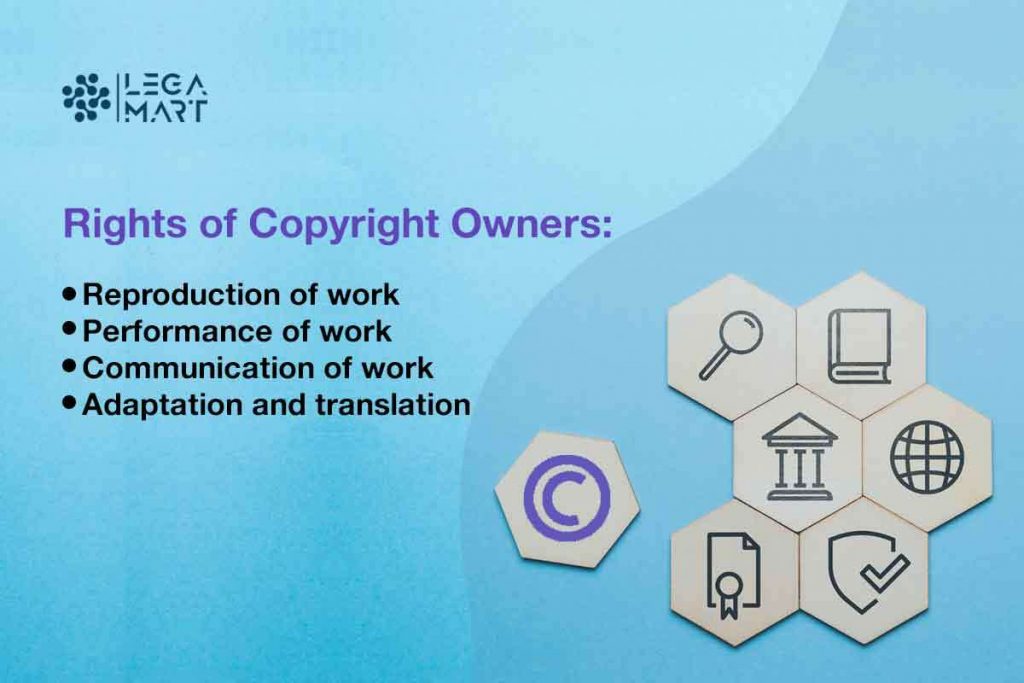
Every copyright holder has some exclusive rights to enjoy its originality and creativity. These rights designate legal ownership and original authority of the work to its registered holders. US Copyright law provides the following exclusive rights to copyright holders :
Reproduction of work
Under this right, no one other than the owner may make any copies or reproductions of the work. And because of this, streaming services must opt for music licensing, and creative commons license from copyright owners to reproduce any songs in their catalogues.
Performance of work
Under this right, the copyright owner can perform the work publicly. This right includes performance on live shows, radio/Tv broadcasts, uploading to youtube audio library, uploading as youtube music, music playing in public, music on listening platforms, a song on a platform like Spotify etc.
Communication of work
Under this right, work is made available for being seen or heard or otherwise enjoyed by the public. This refers to music publishing and its display to the public.
Adaptation and translation
Under this, a new form of work is prepared using existing work in the same or different form, like a transcription of music or any act of alteration and rearrangement of an existing musical work.
Copyright registration
Copyright exists automatically once the music is created in a tangible embodiment, but steps can be taken to enhance the protections. The most important step is registering the musical work. Keeping your song as free music, royalty-free music, and uncopyrighted music may lead to a risk of its misuse or exploitation. Registering a copyright for your work within three months of its publication or before any infringement can be beneficial and gives weight to the validity of copyrighted work.
Registration procedures
Registration is a way to create a record of the copyright of your work with the US Copyright Office. Upon registration, the office sends a certificate confirming the registration. To register a copyright in the office, the owner has to submit a completed application form, filing fee and copies of the work. Registration can be done online by logging in to the copyright office online system, filling out the form and submitting the payment and copy of the work.
Does the “poor man’s music copyright” principle count as proof?
“The poor man’s copyright” is when a musician emails or sends a copy of their composition/recording to themselves through a certified mail, sealed package, etc. This method has now become useless and is an ill-advised method for proving copyright.
In 2019, the Supreme Court had ruled that you are required to register with the US Copyright Office before you file your lawsuit. This means that an unregistered copyright cannot be contested in the court.
Ways to copyright your music(applying for copyright registration)?
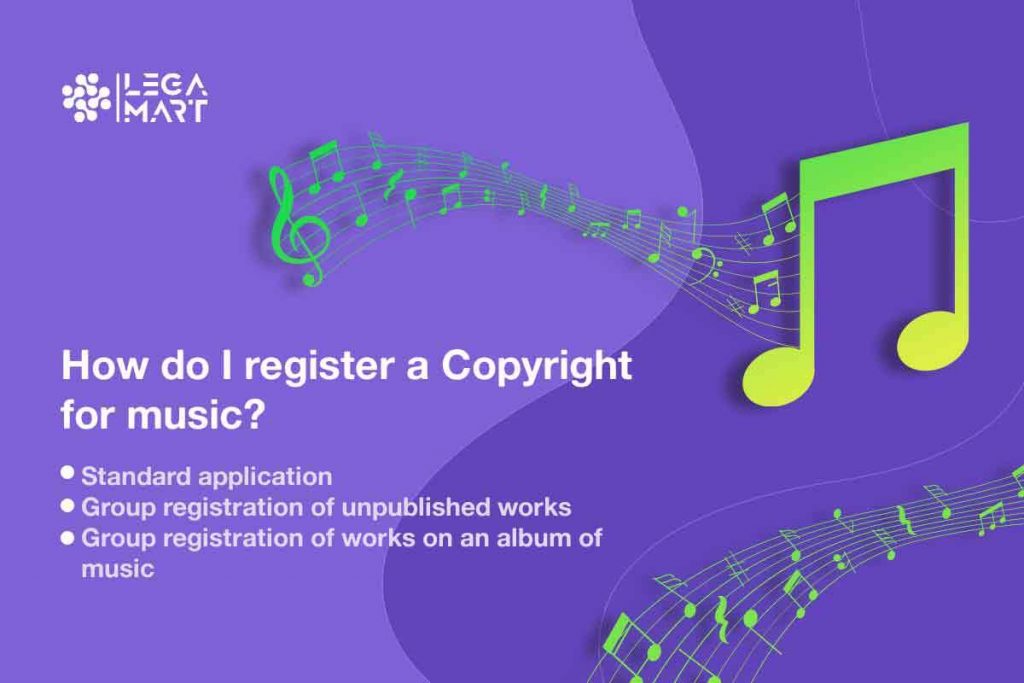
Applying for copyright registration requires an application, filing fees, and a copy of the work. Also, there are the following ways to get your song registered online based on the type of work you are seeking protection for:
Standard application
This application can be used to register sound recordings, songs, or musical work.
Group registration of unpublished works
This application can be used for registering up to ten works together, all by the same author, and the author is the claimant.
Group registration of works on an album of music
This application can be used for registering up to twenty works together all by the same or having at least one common author and claimant for each work in a group is the same only.
Before going forward with any registration process, ensure that you’ve done adequate copyright research to avoid last-minute hassles or rejections.
How to register your music copyright with the US Copyright Office by yourself?
For registering your music copyright directly with the US Copyright Office by yourself, you are required to file:
- Form PA for composition
- Form SR for a sound recording
You can use Form SR to register both sound recording and composition as well, however, this is only possible if the author and owner are exactly the same for all songs listed on the application and the release information is the same.
Copyright infringement in music
In the context of music, copyright infringement refers to the violation of copyright terms, which can take various forms, such as making unauthorized copies of a band’s CD and distributing them to others, setting up websites for the free downloading of copyrighted music without permission; or using uncredited samples in a song and releasing it without proper licensing.
In the era of social media and technology, the most common forms of copyright infringement in music can be when users attempt to upload videos to social media platforms such as YouTube, TikTok, Facebook, and Instagram, and the videos contain copyrighted soundtracks. Such videos may be muted or even removed to protect the websites against music copyright infringement. This is because using someone else’s recording as the soundtrack to your video without proper licensing or permission violates various copyright laws.
A good example of copyright infringement in music on social media platforms is the case of Sony Music Entertainment v. Vital Pharmaceuticals Inc, U.S. District Court for the Southern District of Florida, No. 1:21-cv-22825.
A summary of this case is that; In August 2021, Sony Music Entertainment filed a suit for copyright infringement works against Bang an energy drink brand, and its parent company, Vital Pharmaceuticals, for using at least 132 unlicensed Sony-controlled sound recordings in promotional videos posted on social media platforms like TikTok, Instagram, YouTube, and Facebook. The titles of these songs include “Bad” by Michael Jackson “, Please Don’t Go” by Mike Posner “, Gimme More” by Britney Spears, “Worth It” by Fifth Harmony, and “Say So” by Doja Cat. Sony further alleges that Bang Energy has also utilized trending songs to increase its popularity.
Sony Music claims that the videos contain copyrighted sound recordings and musical compositions owned or exclusively licensed by Sony Music, and despite identifying the infringing posts, the Bang continued to use Sony Music’s copyrighted musical work in their videos. Sony Music has sought statutory damages of $150,000 per infringement.
In July 2022, Sony Music requested that U.S. District Judge William Dimitrouleas rule that Bang Energy’s videos had violated its copyrights and that the company was responsible for the infringing videos posted by the influencers it paid.
The judge found it “undisputed” that Bang had used Sony Music’s music without permission and held the company directly liable for copyright infringement. Additionally, the judge found Bang vicariously liable for the influencer-posted videos but did not rule in favour of Sony Music’s contributory-infringement claims. The judge also dismissed Bang’s argument of fair use and its claim that Sony Music was not entitled to actual damages or lost profits.
How to protect your song from copyright infringement?
To protect your musical work from copyright infringement, you can take the following steps:
Fix your musical work in a tangible medium of expression, such as by writing it down on paper or recording it. This grants you copyright protection immediately. Additionally, it is recommended to keep a record of the date of creation.
Register your song with a copyright office: Consider registering your copyright for added advantages, such as the ability to sue in federal court for infringement and the court’s recognition of your ownership.
Registration also allows you to seek more compensation in a lawsuit.
Add a copyright notice: Adding a copyright notice to your song, such as © [year of creation] [your name], can help deter potential infringers by notifying them that the work is protected. For example, for sound recordings, use the letter P within a circle, along with the year of first publication and the name of the copyright owner; and for written music on the other hand, use the letter C within a circle, along with the year of publication and the name of the copyright owner.
As the composer or author of the work, you have moral rights that cannot be transferred to anyone else. By having these moral rights as the author or composer of your song, you have additional protection beyond copyright law. You may choose to waive these rights, but they provide an additional layer of protection for your work.
Rules of music copyright law
Copyright law has the following rules for copyright music which should be followed:
Work must be original
The work must be a unique result of the creativity of the owner to make it their original piece.
Violation must be established in court
If any violation of the owner’s right is encountered due to misuse of copyrighted music and the owner’s permission to fair use, it must be established in court. If the offender is found guilty, he has to compensate the copyright holder.
Lasts more than a lifetime
Copyright protection lasts for 70 years after the death of the copyright holder, which makes it a lifetime protection.
Management and administration
The master copyright is managed by a record label, and the music composition copyright is administered by publishers.
What happens when you are using someone else’s work?
Being inspired by someone else’s work often becomes a part of the creative process of creating the song. Musicians often tend to make use of other works for the creation of their new compositions, public performances, and recordings. However, you must be careful while making use of the already existing works. Here, you are required to keep in mind some common copyright principles:
- Use a work which already exists in the public domain.
- Get permission from the copyright holder directly, or try to license the work in accordance with the terms and conditions of the license contract.
- Rely on a statutory limitation or exception, such as the fair use doctrine.
Please note that trying and failing to contact the original owner of the song is not a substitution for permission. Therefore, you are required to receive an explicit permission for making use of their copyright.
Length of copyright registration
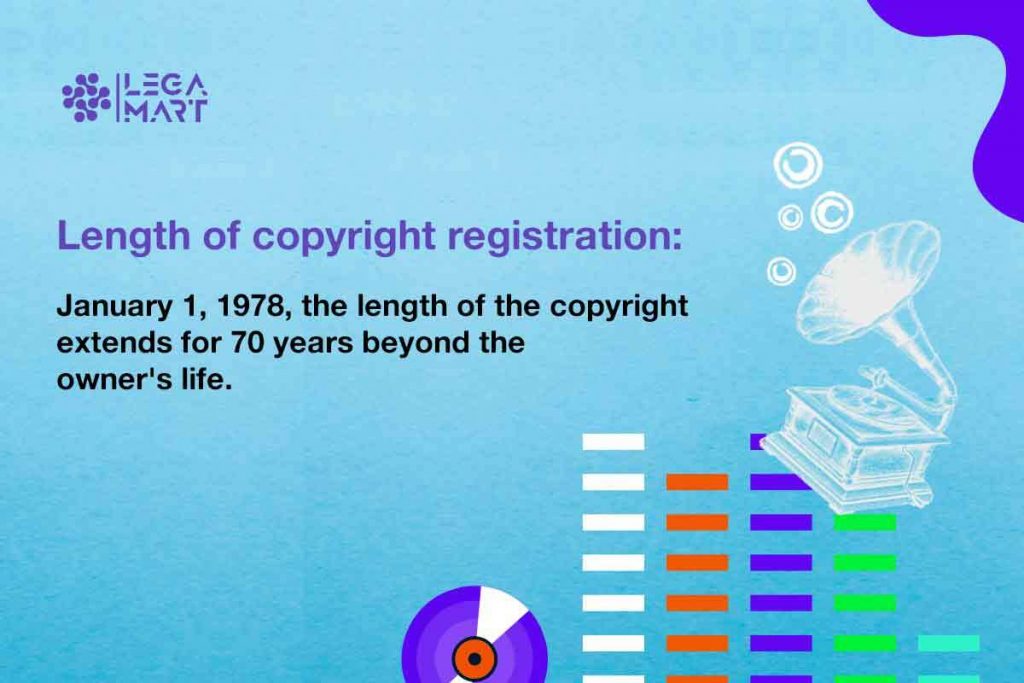
Generally, for works created and published after January 1, 1978, length of copyright extends for 70 years beyond the owner’s life. And if there is more than one owner, the protection usually extends to 70 years from the death of the last living owner.
Limitations on copyright
Copyright is a powerful deterrent from unlawful exploitation of your creations. Understanding its limitations helps you determine the action you need to pursue against exploiters of your original work. Here are the limitations to copyright protection:
Doctrine of First Sale
This doctrine puts exceptions to the distribution rights of the copyright owner and states that they lose distribution rights on specific mediums once it’s first sold.
Digital Millennium Copyright Act
This act provides for a notice and takedown procedure where the individual or group of a person having copyright owner provides notice to the online service provider informing about the infringement. The service provider then investigates this and takes down the work if it infringes the original owner’s rights.
Fair use
This is the most prominent defence in any copyright infringement and can be seen as a transformative use of the copyright holder’s work for the public interest. There should be fair use of copyrighted material.
How much does it cost to get a copyright?
The cost to get copyright varies depending on what you are registering and how exactly you choose to apply for it. Presently digital registration of a single author and standard application can cost $45 and $65, respectively, and physical application registration can cost $125. These fees are subject to the current schedule of fees.
How to copyright a song?
Registering a copyright for your song can be full of benefits to you. There are various state laws and international treaties that discuss copyright. For copyrighting a song, complete a copyright application, pay the filing fee, and submit the music to the US Copyright Office. This process can be done either online or offline. Once the application is filed, the copyright office will notify you about the status and issue a certificate of successful registration.
It is easy to get misconceptions about copyrighting a song, and you may find it confusing. To avoid this and seamlessly go with the process, professional help is advisable. So to copyright a song, you can consider the above-mentioned process under some expert guidance and support.
If you are working in a creative field, such as writing songs or making Cinematograph Film, ensure you have the documentation and legal copyright search process to get that legal backing on your artwork!
How to use copyright to protect your work?
When it comes to musical work, writing them out on paper grants instant legal rights to you on its original authorship. If this music comes as public domain music, then anybody may misuse it. There may be a situation that someone sitting in another city, a few times later, writes similar lyrics to your non-copyrighted music.
And at this point, it may become difficult for you to prove that you wrote it first, so registering your work is the best way to deal with such situations. Also, international copyright protection on music must be considered. Through copyright registration, you can easily establish your priority as the original first author of the lyrics.
Conclusion
Awareness about copyright your music and copyright laws for the music industry is important in our society, as creativity is a powerful essence of growth. We tried writing down everything you should know about copyright on music. It is important to talk to a copyright lawyer at every stage of your copyright process. This includes professional help for filing copyright your music, handling copyright infringement, copyright claims and defending your copyright. Legamart has a trusted network for legal aid in all jurisdictions.
Frequently Asked Questions (FAQs)
Is it possible to copyright multiple songs at once?
Yes, it is possible to copyright multiple songs at once. This can be done in the form of a collection or an album under a single registration.
Is it possible to copyright a demo or an unfinished song?
Yes, it is possible to copyright a demo or an unfinished song. As long as your song is in a tangible form, it is eligible to receive the required copyright protection.
Is it possible to protect your music without obtaining copyright?
It depends on the jurisdiction. Usually, countries allow people to pursue legal actions if their work has been unlawfully used without their permission. However, for jurisdictions like the US, there is an explicit requirement of registration, before you can contest any legal action.

